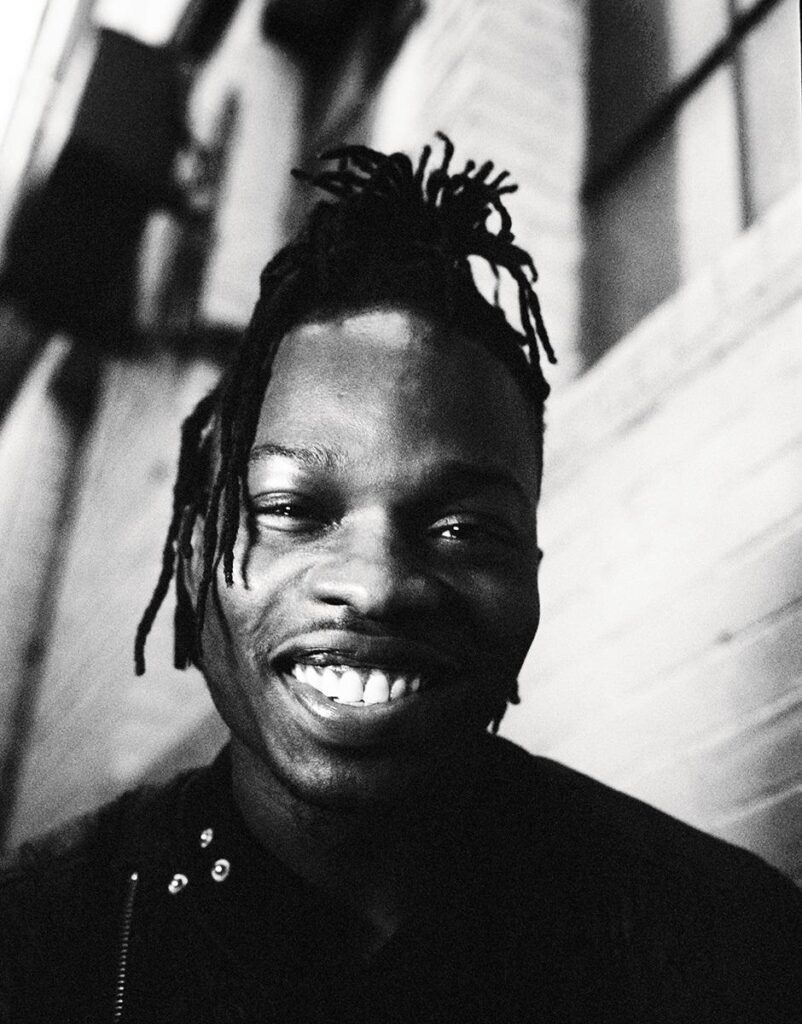NAIRA MARLEY: ZEITGEIST OR POLTERGEIST
by Didi Cheeka

For the first time in Nigerian society, there seem to be a widespread nihilist
movement, whose only programme is internet fraud and a loosening of sexual standards, and whose sole leader, fittingly, is alleged fraudster and porn singer: Naira Marley. Underlying this spirit of destruction, even among those who still believe in God, seem to be the idea that sexual promiscuity is the new zeitgeist, the road to salvation. Marlian theorists – yes, there is such a thing – define Marlians as people who love to enjoy and have fun. Well… love to enjoy and have fun too. Did Puritanism [ever] infect our thinking so much that we now consider having fun and sensual enjoyment as effective political-social mobilization – against what exactly? What is it about sexual vulgarity, vicariously experienced, that impress so many of Nigeria’s educated middle class?
Perhaps it’s an escape from the ennui, the emptiness of middle-class existence – a dull life, a dull job, a dull marriage? It’s, I think, significant that those identifying as Marlians are middle-class persons (mostly, from arts and entertainment) whose lifestyle and certain ‘affluence’ has turned into a sort of lumpen ‘elites’. Their fascination with Naira Marley, therefore, is a form of prison-break. Pop culture, in Nigeria, has always been responsive to the needs of this class – otherwise it would be unable to subsist. It exploits this need, this crisis of value and satisfies it only superficially. And so, even the most meaningless of songs, peppered as they are with lewd lyrics, cater to the dissatisfied apetites of this class by providing that which is missing in their lives – the thrill of sexual vulgarity, illusion of street-cred, passive voyeurism.
There is, in this craving for satisfaction, the need to belong, to identify with the actual ‘owners’ of these lyrics – the real lumpen youths who, familiar as they are with these words are not thrilled by them the same way as their elite counterparts. There is a measure of irresponsibility in this need to vicariously identify: a job, a home, and the life that goes with them are not worth the deal for the real lumpen. But these are values which middle-class persons pretending to be street, delinquents crave. Are necessary values threatened by the lyrics of a pop song? Among Naira Marley’s repertoire is a song, Am I a Yahoo Boy?, in praise of criminality. It is one thing to call yourself a Marlian and dance Zanku, but, when Yahoo practice demands ritual killing, you become potential victim – and guilty, at the same time, of the moral indifference that helped create a pervasive immorality. Indiscriminate violence and thievery is as likely to target a Marlian as a non-Marlian.
I’m reminded of the passionate enthusiasm with which French philosopher, Michel Foucalt, became one of the leading supporters of Ayatollah Khomeini’s regime, theorizing and deploying Iran in his critique of the West/ Europe without a rigorous study or understanding of the forces at play, referring to its “political spirituality” as a radical departure and opposition to America and Europe’s capitalism and Soviet Russia. It wasn’t until Khomeini’s regime consolidated and revealed its authoritarian nature, with Foucault banned from travelling to Iran, and a close friend executed that he realised his misplaced illusions. It is easy to find traces of Foucault’s enthusiasm among Nigeria’s educated middle-class in their theorizing and deploying of juvenile delinquency against an imagined Puritanism.
I have in mind two articles: “Naira Marley, Marlians, and His Aural Pornography”, and “Has Naira Marley Defeated the Hypocrisy”, by Dami Ajayi and Carl Terver. The impression you get, from these writers is quite obvious: these seemingly respectable, educated middle class male persons (of course, they’re not all males) think that referring to female genitalia by a number of vulgar names is “sexual revolution” and a “defeat” of “hypocrisy”. In the sense that these writers, and the singer they adore, are running back to adolescent boys’ attitude towards sex – braggartism. Expressed in the articles is a fascination, an addiction to easy, vicarious, “aural pornography”. As an aside, part of what passes for criticism today is narcissistic and self-congratulatory. You get the impression the writer is not really invested in the subject, is interested in criticism as a form of literary chic.
The so-called sexual revolution and defeat of hypocrisy is superficial – underneath, sexual dysfunction, repression, and dissatisfaction still exists, especially, among the educated middle-class. And this accounts for the increasing lyrical infatuation with, and vulgar fetishism of sex. Nothing, as Nabokov noted, is more exhilarating as philistine vulgarity – and the more vulgar, the trendier. It’s the desire of a certain kind of male person, confronted by the new, brash ‘feminism’, to put women in their place by shaming them with the vulgarisation of their sexuality. By a sleight of hand, the writers generalize and palm off this attitude as representative of Nigeria’s youths. And, thus, they fail to contextualize these songs: the torrential descent of taste into thrash.
The phenomenon of music touching a social nerve is not new in Nigeria. Fela’s afrobeat expressed a fundamental hostility to authority and the status quo – and Fela paid for this with police brutality, destruction of property by the army, arrest and imprisonment. In the hands of Fela, vulgarity and anti-intellectualism became weapons against the official Victorian morality, colonial education, upper/ middle-class sartorial affectations, mannerisms and [good] taste. This vulgarity and anti-intellectualism, given the context, was not devoid of meaning and the authority, rightfully, saw it as a threat. It was rebellion in touch with its time: there was a large body of active rebellion – the Black Panther/ Black Power movement, the anti-apartheid struggle, the student movement in Nigeria. Things, as Hegel pointed out, tend to turn into their opposite: vulgarity and anti-intellectualism are the new status-quo, the official morality of Nigeria’s current political elite.
Fela’s delinquency was disturbing to the authority because he was delinquent to values they held dear. Mr. Marley’s delinquency is an act: he is delinquent to the same values the political elite are really delinquent to. His middle-class admirers recognize in Marley’s pretend indifference something of their own fake lifestyle. If we identified somewhat with Fela, it was simply because, in a way, we recognized what he was fighting against. With Naira Marley, however, there is duplicity at play here: he has not dropped out of the whole system of commercialization and profit-making, and aggregates followers for the purpose of monetizing them. Confused feelings of political disorientation and fear of police harassment combine to create, for a certain layer, a most unlikely hero. The cult reality and criminality of youth culture – gang killings and internet scam – for this layer, are romantic in their need to identify with the amoral success of their hero.
In a past period, Nigeria had produced politicians who were scholar-statesmen/women, now all the country seem able to bring forth are political buffoons. So when Naira Marley says, “Having big booty is better than having a Masters degree,” he shares and accepts the outlook of a political elite whom “we asked for school, they gave us prison.” Perhaps, I’m being unfair and there is no large body of rebellion -Black Lives Matter, Fees Must Fall, Occupy Nigeria – that Mr. Marley could tap into? A generation gone by produced Ali Must Go, Ango Must Go, Anti-Sap Riots, June 12 Pro Democracy struggles. Naira Marley’s music (to be fair, he’s not the only one) has the dubious merit of saying to Nigeria’s political elite, “this is what you’re, this is all you’re capable of producing.” For the educated middle-class Nigerian, Mr. Marley is the ultimate satisfaction of an infantile fantasy.
I’m not writing to provide an aesthetic critique of Naira Marley’s music – I don’t think it’s worth the effort. Nor am I trying to say that he makes bad music – of course, I imply it – especially, since what is bad about it is precisely what those who call themselves by his name are responding to. “If I’m a bad influence,” the singer said, I’m still trying to work out what influenced me to be bad.” This is slightly less sophisticated than the trite “poverty made me do it.” I’m not saying that Mr. Marley is a corrupting influence on Nigerian – what I say is that he is a cultural expression of the corruption of the country’s youth, it’s political elite, it’s educated middle-class, it’s society. There is neither sexual revolution nor defeat of hypocrisy. What we have is a fetishism of form – not the real thing. The decay of human relationship, in decaying capitalist society expresses itself in the decay of language: ho, bitch and the rest. This is, perhaps, why the spirit of the time manifests as a noisome spirit – that disturbs only itself.





1 thoughts on “NAIRA MARLEY: ZEITGEIST OR POLTERGEIST”